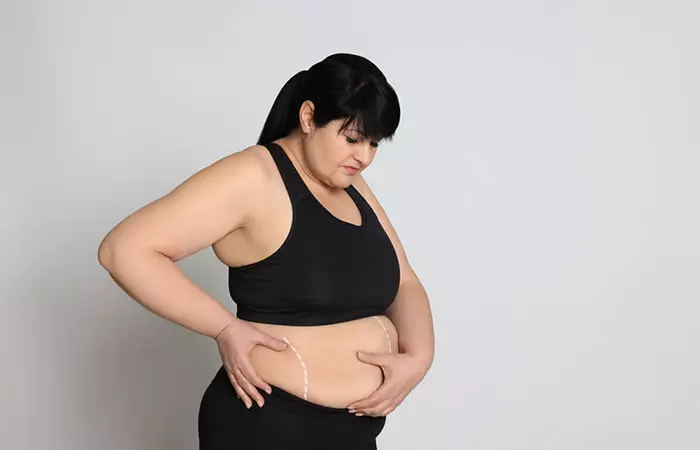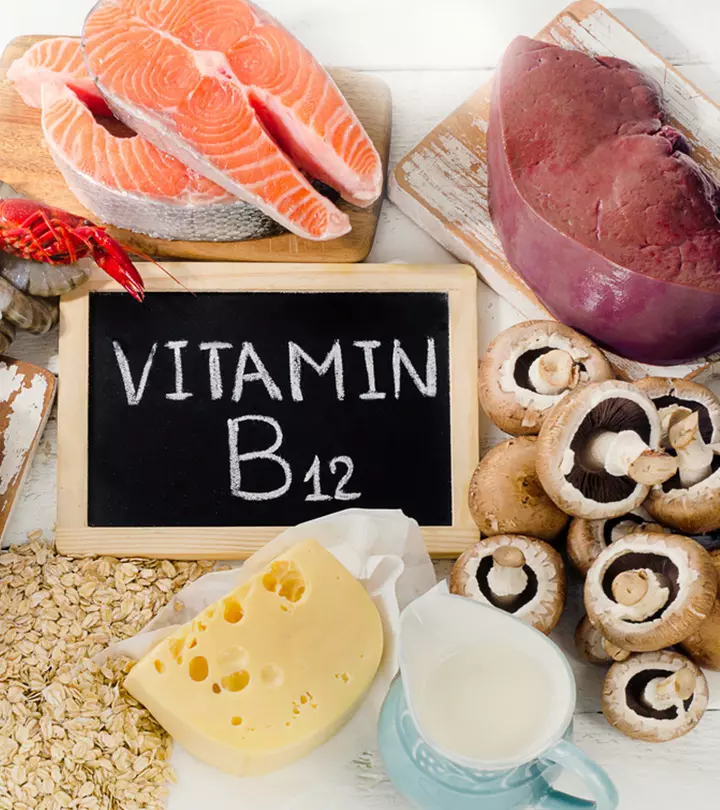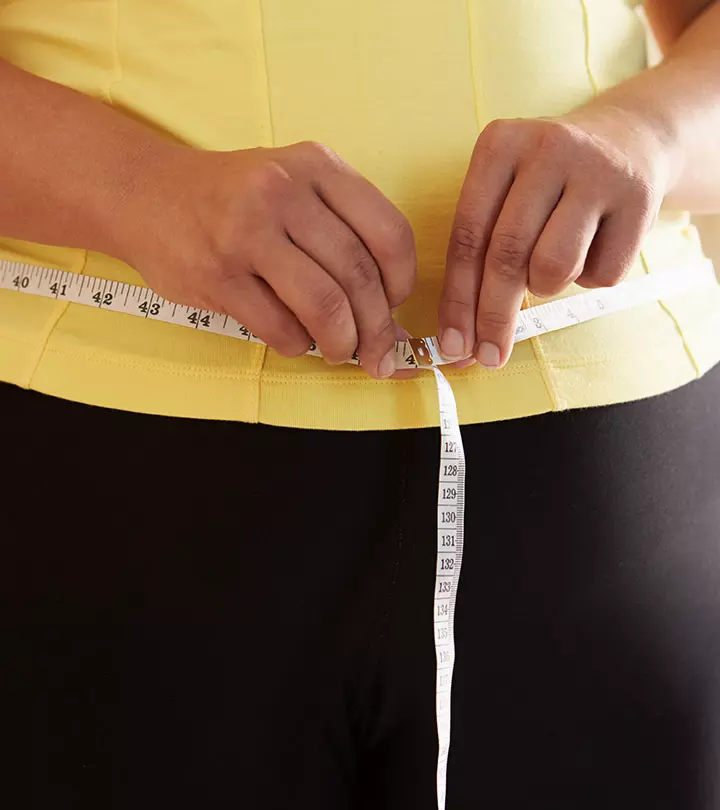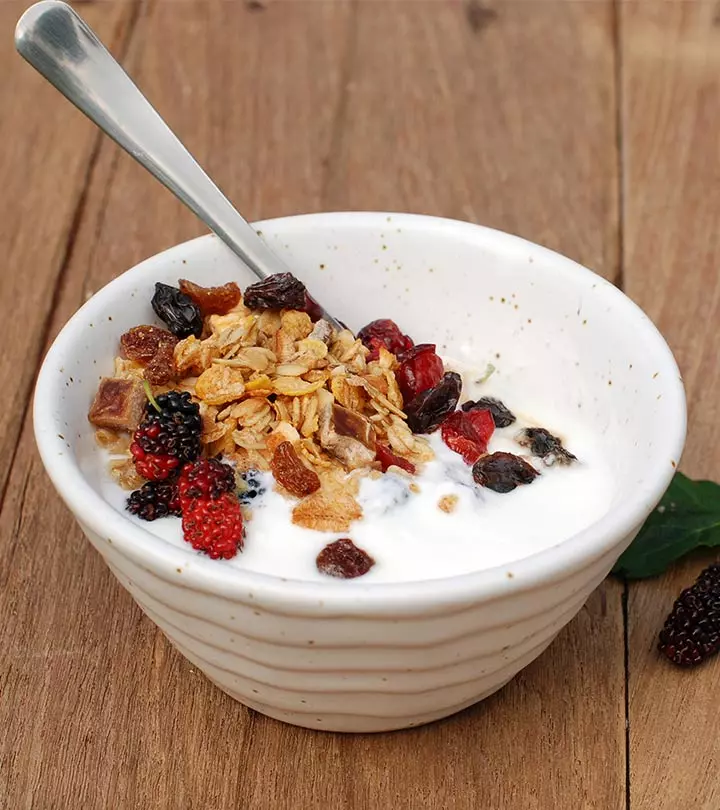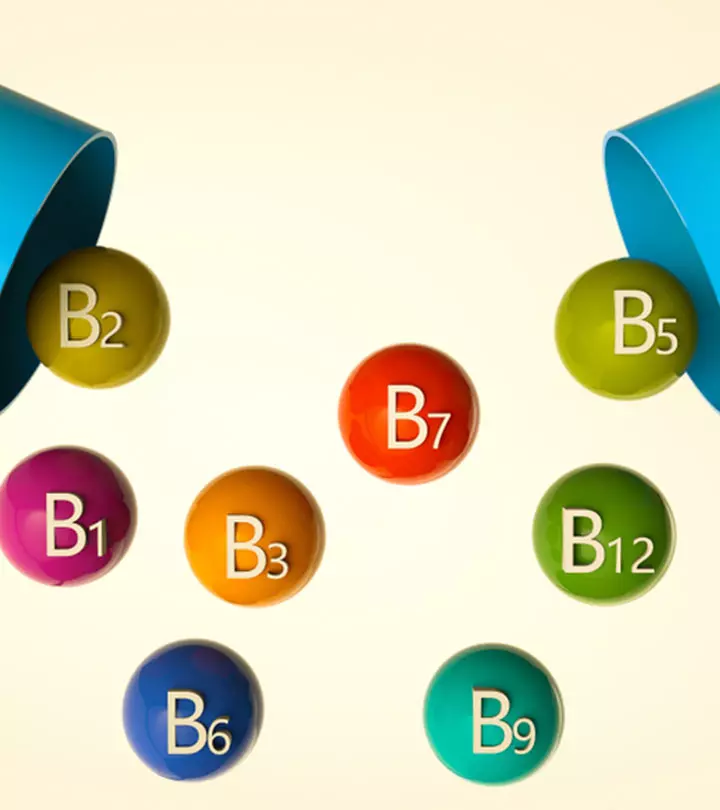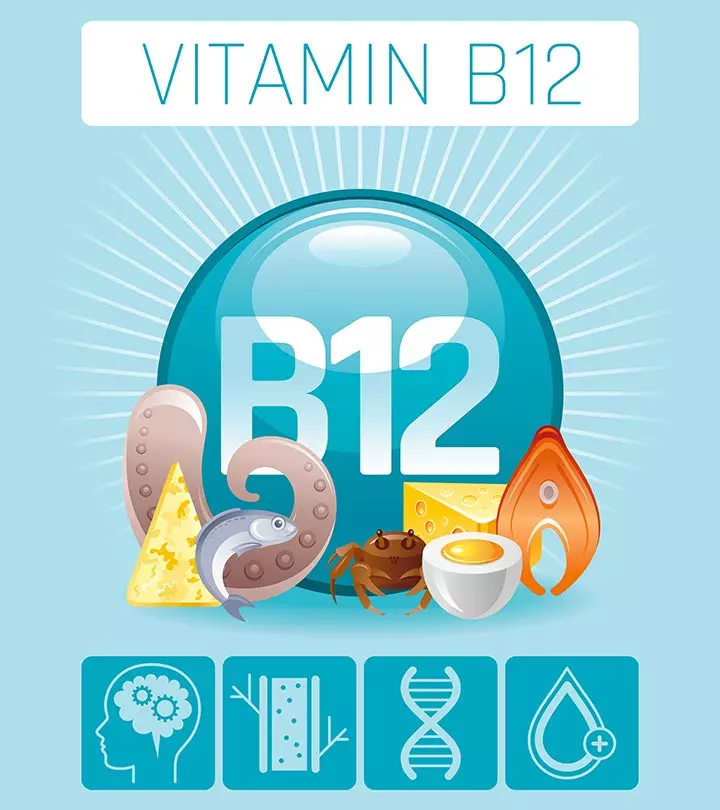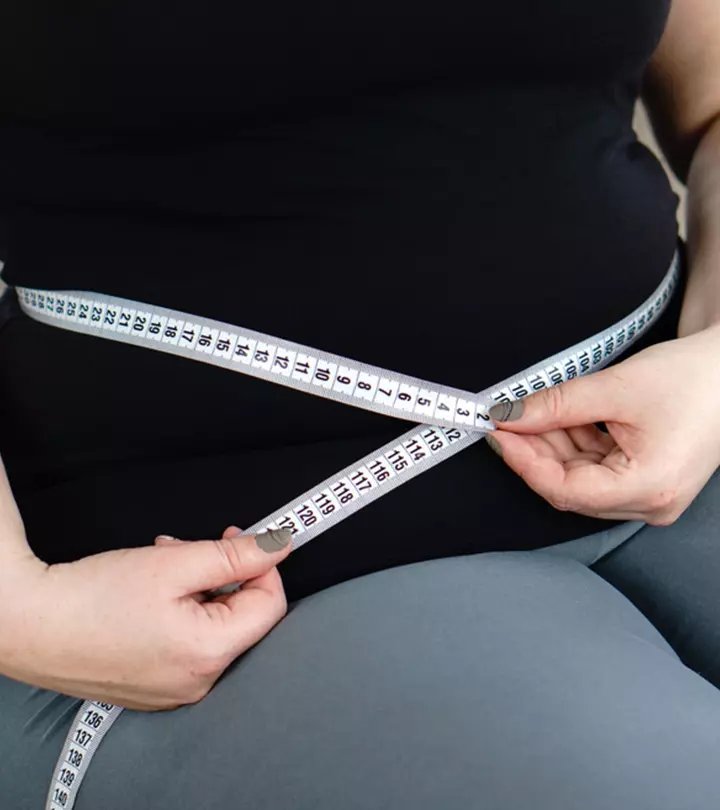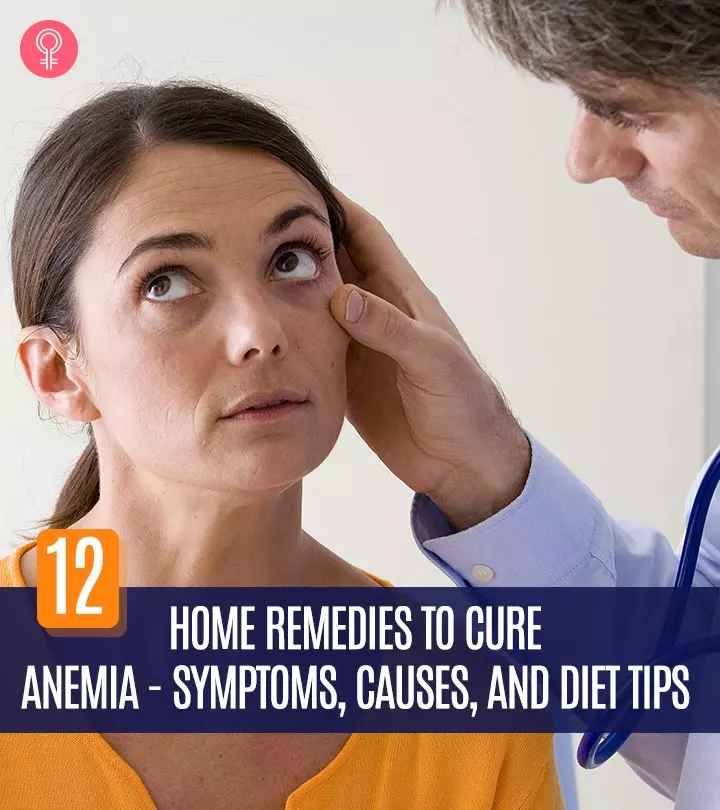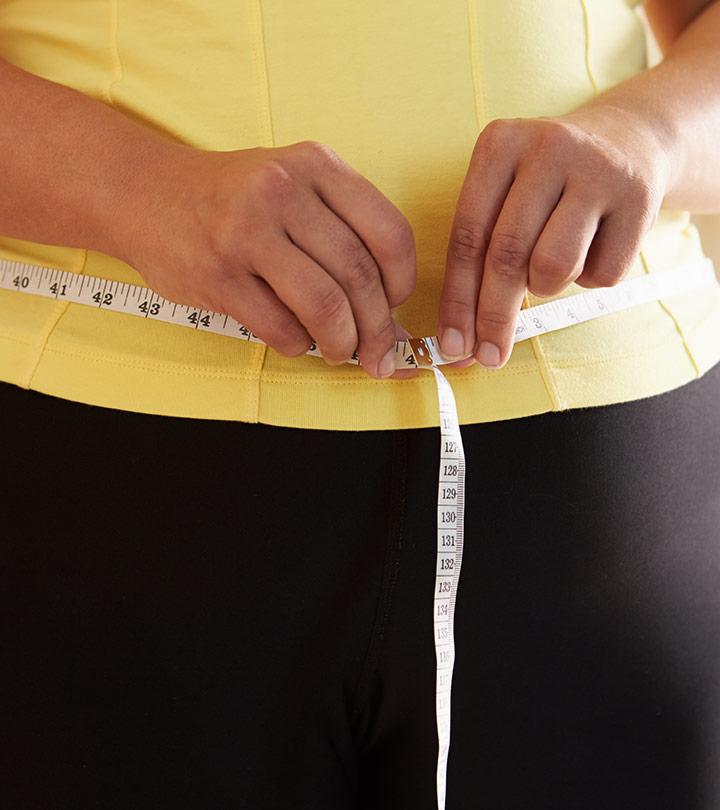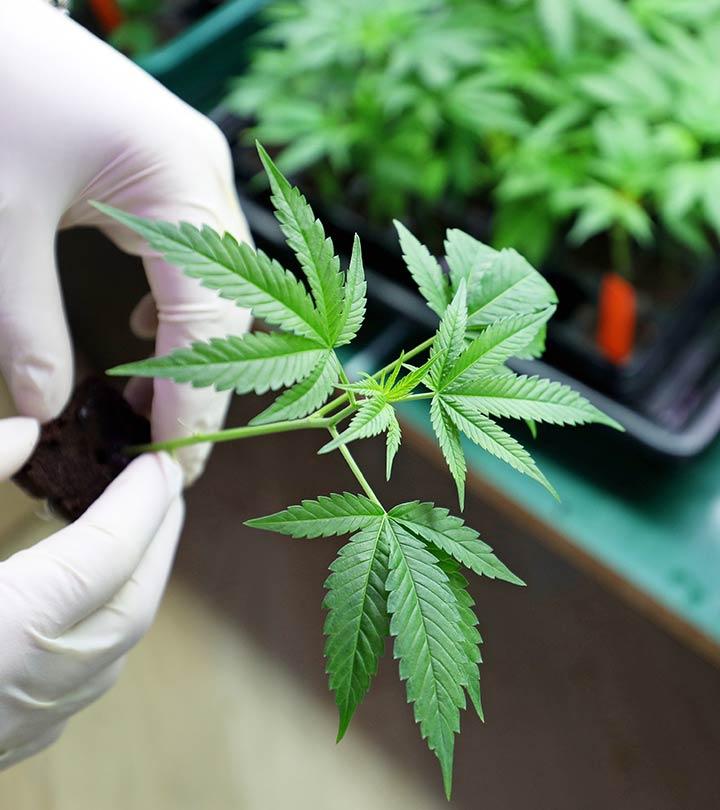Does Vitamin B12 Deficiency Lead To Weight Gain? What You Should Know
Find out if a deficiency of this vitamin can make you pack on those pounds.

Image: ShutterStock
People often think vitamin B12 deficiency and weight gain are linked. But how true is this assumption? Before we go ahead, let us learn about some of the physiological functions of this vitamin, which is also referred to as cobalamin.
Vitamin B12 is water-soluble and essential for the proper functioning of the brain and nervous system. This micronutrient also has a role to play in blood cell formation, energy production, and DNA synthesis (1). Its deficiency can manifest in the form of a nervous disorder, anemia, and poor energy levels (2). But how is it related to weight gain? Keep reading to find out!
 Trivia
TriviaIn This Article
Symptoms Of Vitamin B12 Deficiency
When there is a deficiency of vitamin B12, cell division slows down. Due to this slow cell division, red blood cells are enlarged and destroyed by the immune system. There are several Symptoms Of Vitamin B12 Deficiency (3), (4). They are:
- 1. Chronic Fatigue – Vitamin B12 deficiency can cause a persistent feeling of exhaustion and tiredness.
- Incontinence – Due to vitamin B12 deficiency, the bladder is incapable of holding urine, and leakage occurs.
- Shortness Of Breath – Shortness of breath or slow breathing is mainly caused due to B12 not being properly absorbed by the body.
- Forgetfulness – Forgetfulness is a common symptom that occurs when the neurological system is deprived of vitamin B12. Severe deficiency may result in memory loss.
- Hallucinations And Psychosis – Extreme symptoms that can occur due to vitamin B12 deficiency are hallucinations and mental weakness. It can also make you feel tingling sensations and numbness.
Does Vitamin B12 Lead To Weight Gain Or Weight Loss?
There is very little evidence to suggest that vitamin B12 leads to weight gain or weight loss.
Studies associate low vitamin B12 levels with obesity due to slow metabolism. However, people with a normal BMI range showed a negative correlation with vitamin B12 (5). Another study associated obesity in children and adolescents with an increased risk of low vitamin B12 levels (6). Prolonged obesity can lead to the development of insulin resistance as the deficiency disturbs the adiponectin levels.
A recent study on US population shows that high serum vitamin B12 levels are inversely proportional to body weight, but the underlying mechanism needs further investigation (7).
A study in NewYork states that long-term supplementation with vitamin B12 can lead to less weight gain (8). However, more studies are required to arrive at a conclusion.
A 15-year-old boy with macrocytic anemiai A condition in which the bone marrow produces excessively large red blood cells, which results in low hemoglobin. and other clinical conditions, when supplemented with intravenous cobalamini The procedure of injecting vitamin B12 (cobalamin) directly into the vein with a needle or tube so it can quickly enter the bloodstream. , showed an increase in appetite and weight (9). This may have been due to the imbalance in leptin and ghrelin hormones.
It is pretty clear that current evidence is inconclusive to establish that vitamin B12 deficiency leads to weight gain. However, low vitamin B12 levels are observed among people with obesity issues.
 Trivia
TriviaIf you are experiencing any of the vitamin B12 deficiency symptoms and weight changes, scroll down to see what the best sources of vitamin B12 are that you can include in your meals.
How To Get More Vitamin B12?
The best and natural way to get vitamin B12 in your body is to eat foods that contain it. Foods rich in vitamin B12 include (4):
- Meat and chicken
- Seafood
- Eggs
- Dairy and dairy products
- Fortified breakfast cereals
Apart from these natural sources, you can also take vitamin B12 capsules, syrups, and health drinks that can help bring your vitamin B12 levels back to normal. But before taking any supplements or medicines, make sure to consult the doctor.
Now that you know about vitamin B12 deficiency and how to increase it, let us take a look at what constitutes normal vitamin B12 levels in the next section.
What Are The Normal Vitamin B12 Levels?
The following indicates the different vitamin B12 levels (10):
- Above 300 pg/mL – normal
- 200 and 300 pg/mL – borderline
- Below 200 pg/mL – deficit
Vitamin B12 Injections Dosage And Frequency
Vitamin B12 is commonly administered through cyanocobalamin injections (11). A study published in PubMed found that 1000 micrograms of 5 to 6 injections every two weeks is the ideal dose as compared to 100 micrograms as it helps your body retain more vitamin B12. However, it is recommended that you consult your doctor for the correct dosage and frequency.
A blogger, with possibly undiagnosed Myasthenia Gravis, shares her experience of taking vitamin B12 injections in her personal blog. She excitedly notes, “I have been shocked by my response to the B12 injection, thinking it could be days or months before I would see any results. The first thing I noticed this morning is that there has been a massive reduction in the nerve pain in my leg (i).”
Infographic: Practical Ways to Amp Up Your Vitamin B12 Intake
Vitamin B12 is essential for the proper functioning of our bodies. It helps produce the necessary chemicals that influence our mood and other brain functions. But do you know that you can manage a deficiency of vitamin B12 by just changing a few things about your eating habits? In the following infographic, we have listed the different ways for you to boost your B12 intake. Check it out!

Illustration: StyleCraze Design Team
The nervous system and blood circulation depend on vitamin B12. Hence, inadequate levels of this vital vitamin may lead to chronic fatigue, forgetfulness, or hallucinations. Vegetarians are more likely to be deficient in vitamin B12 as plant-based foods have low levels of this vitamin. A common belief among the masses is that low vitamin B12 levels may lead to weight gain. However, there is very little data to suggest a link between vitamin B12 deficiency and weight gain. Generally, individuals with a high BMI may have low vitamin B12 levels. Consult your healthcare professional if you observe unexpected weight gain to figure out the cause.
Frequently Asked Questions
Can low vitamin B12 make you tired?
As vitamin B12 is required to operate biochemical reactions for energy production, low levels of B12 cause you to feel tired because of lack of energy production.
Can low vitamin B12 cause anxiety?
Vitamin B12 regulates functions of the nerves. Hence, low B12 levels may cause psychiatric symptoms like depression, anxiety, as well as hallucinations.
What is the difference between vitamin B12 deficiency and anemia?
There is no difference between B12 deficiency and anemia. In fact, vitamin B12 deficiency leads to anemia as it regulates functions of red blood cells.
Do almonds have B12?
No, almonds do not have vitamin B12.
Can stress increase b12 levels?
No. Anecdotal evidence suggests that stress can deplete vitamin B levels in the body, especially vitamin B12. And hence people with anxiety and depression may be more prone to vitamin B12 deficiency.
Does beetroot have B12?
Yes, beetroot is a rich source of vitamin B12 (and other B vitamins) and is also packed with vitamins A and C (12).
Does B12 make you sleepy?
No. There are no studies that prove a direct relationship between vitamin B12 levels and sleep.
Key Takeaways
- Vitamin B12 is essential for brain and nervous system functioning and aids energy production and blood cell formation.
- Long term supplementation of B12 may lead to weight gain.
- A lack of this vitamin may cause low energy levels, chronic fatigue, mental health issues, and shortness of breath.
- Eat vitamin B12-rich foods like fortified cereals, dairy products, eggs, seafood, and meat.
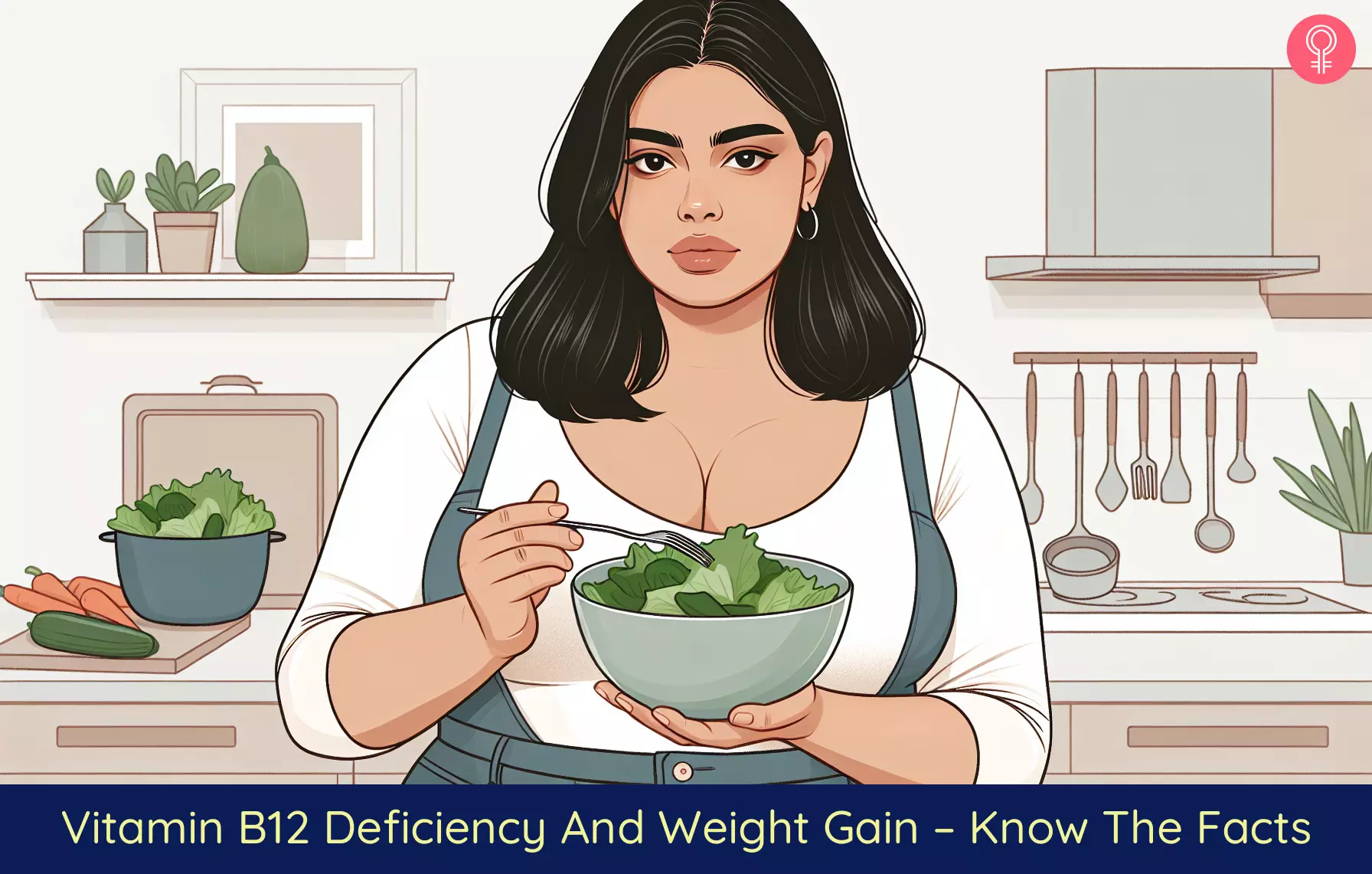
Image: Dall·E/StyleCraze Design Team
References
Articles on StyleCraze are backed by verified information from peer-reviewed and academic research papers, reputed organizations, research institutions, and medical associations to ensure accuracy and relevance. Read our editorial policy to learn more.
- Vitamin B12, Micronutrient Information Center, Linus Pauling Institute, Oregon State University.
https://nap.nationalacademies.org/read/6015/chapter/11https:/lpi.oregonstate.edu/mic/vitamins/vitamin-B12 - Vitamin B-12, Advances in Nutrition, An International Review Journal, US National Library of Medicine, National Institutes of Health.
https://www.ncbi.nlm.nih.gov/pmc/articles/PMC3262614/ - Vitamin B12 deficiency can be sneaky, harmful, Harvard Health Publishing, Harvard Medical School.
https://www.health.harvard.edu/blog/vitamin-b12-deficiency-can-be-sneaky-harmful-201301105780 - Vitamin B12, U.S. Department of Health & Human Services, National Institutes of Health.
https://ods.od.nih.gov/factsheets/VitaminB12-HealthProfessional/ - Association of vitamin B12 with obesity, overweight, insulin resistance and metabolic syndrome, and body fat composition; primary care-based study, Medicinski glasnik, US National Library of Medicine, National Institutes of Health.
https://www.ncbi.nlm.nih.gov/pubmed/23892832 - Obese children and adolescents: a risk group for low vitamin B12 concentration, Archives of Pediatrics & Adolescent Medicine, US National Library of Medicine, National Institutes of Health.
https://www.ncbi.nlm.nih.gov/pubmed/16953016/ - Inverse Association Between Serum Vitamin B12 Concentration and Obesity Among Adults in the United States, Frontiers in Endocrinology, US National Library of Medicine, National Institutes of Health.
https://www.ncbi.nlm.nih.gov/pmc/articles/PMC6610317/ - Dietary supplements and weight control in a middle-age population, The journal of alternative and complementary medicine : research on paradigm, practice, and policy, US National Library of Medicine, National Institutes of Health.
https://www.ncbi.nlm.nih.gov/pubmed/16296926 - Severe vitamin B12 deficiency in a 15-year-old boy: presentation with haemolysis and pancytopenia, BMJ Case Reports, US National Library of Medicine, National Institutes of Health.
https://www.ncbi.nlm.nih.gov/pmc/articles/PMC4434362/ - Vitamin B12 Deficiency, StatPearls, US National Library of Medicine, National Institutes of Health.
https://www.ncbi.nlm.nih.gov/books/NBK441923/ - Vitamin B12 replacement therapy: how much is enough?, Wisconsin Medical Journal, PubMed.
https://pubmed.ncbi.nlm.nih.gov/8053222/ - Beetroot- A review paper Journal of Pharmacognosy and Phytochemistry.
https://www.phytojournal.com/archives/2020/vol9issue2S/PartH/S-9-2-133-371.pdf
Read full bio of Madhu Sharma
Read full bio of Arshiya Syeda
Read full bio of Sindhu Koganti






